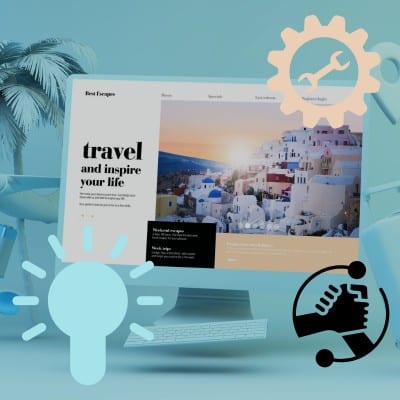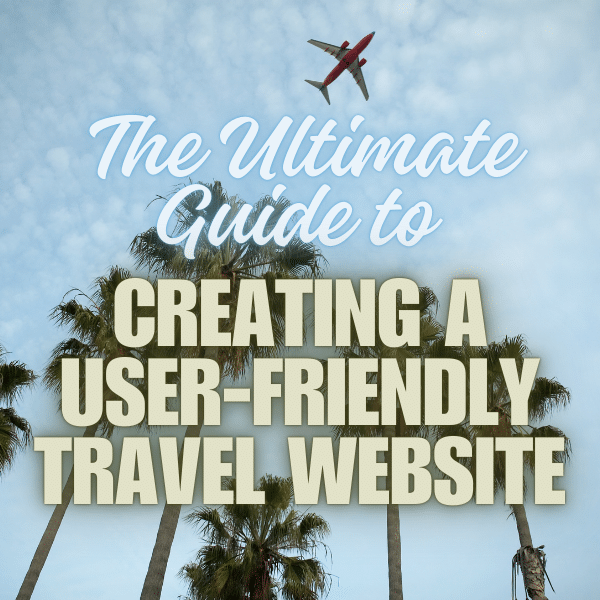Why you can trust Sunlight Media
- Expertise and Experience:Our content is crafted by seasoned professionals with extensive experience in digital marketing, ensuring you receive accurate and actionable advice.
- Unbiased Information:We provide impartial insights and recommendations based solely on what's best for your business, without any hidden agendas or promotions.
- Thorough Research:Our articles are backed by comprehensive research and the latest industry trends, ensuring you stay informed with reliable and up-to-date information.
- Transparency and Honesty:We believe in complete transparency. We disclose our sources, methodologies, and any potential conflicts of interest, so you can trust the integrity of our content.
- Continuous Improvement:We constantly review and update our content to reflect the latest developments in digital marketing, so you always have access to the most current and relevant information.

Creating a user-friendly travel website is essential for attracting visitors, boosting bookings, and providing a seamless experience for travelers. From choosing the right template to integrating an online booking system, every detail matters.
In this guide, we’ll walk you through the key elements of building a travel website that is visually appealing, mobile-optimized, and easy to navigate—helping you turn visitors into loyal customers.
Choosing the Right Travel Website Builder

Selecting the right travel website builder is crucial for creating a seamless and efficient platform for your travel agency. The best website builders offer customizable templates, drag-and-drop functionality, and built-in SEO tools to help you design a professional and high-ranking website without coding knowledge. Platforms like Weblium, and Appy Pie provide specialized templates tailored for travel agencies, ensuring your website is optimized for showcasing destinations, tour packages, and online bookings. Choosing a builder that supports integrated booking engines and payment processing can further enhance the user experience, making reservations smooth and hassle-free.
Beyond features, consider the scalability and support of the website builder. A platform that allows you to expand functionalities with plugins—such as Google Maps integration, multilingual support, or customer review sections—can help meet evolving business needs. Additionally, customer support and security features should not be overlooked; a builder with 24/7 support, SSL certificates, and secure payment gateways ensures a trustworthy website for both you and your clients. Making the right choice at this stage can save time and effort while positioning your travel agency for long-term growth.
Designing a Visually Appealing Travel Website
A visually stunning travel website immediately captures visitors’ attention and makes them want to explore more. High-quality images and videos play a crucial role in setting the right tone—showcasing breathtaking destinations, luxurious hotels, and exciting travel experiences. Using full-screen hero images, dynamic sliders, and video backgrounds can create an immersive experience that draws potential clients in. A well-designed homepage should also include engaging headlines, well-spaced sections, and easy-to-read fonts to ensure clarity and professionalism.
Beyond aesthetics, user experience (UX) design is equally important. A clean, clutter-free layout with intuitive navigation ensures that visitors can find what they need quickly—whether it’s browsing travel packages, reading customer reviews, or making a booking. Strategically placing call-to-action (CTA) buttons such as “Book Now” or “Get a Quote” on key pages can significantly improve conversions. Lastly, maintaining a consistent brand color scheme and typography helps reinforce your agency’s identity, making your website more memorable and trustworthy to visitors.
Designing a Visually Appealing Travel Website
A visually appealing travel website is essential for capturing visitors’ attention and keeping them engaged. Since the travel industry is highly visual, your website’s design, layout, and aesthetics play a crucial role in influencing a visitor’s decision to book a trip. A well-structured homepage with a clean layout, easy navigation, and strategically placed call-to-action buttons ensures that users can find what they need effortlessly. Using a consistent color scheme and typography aligned with your brand identity further strengthens your website’s professional appearance, making it more recognizable and trustworthy.
Beyond aesthetics, functionality and usability are equally important. A travel website should provide a seamless browsing experience, whether users are searching for destinations, viewing tour packages, or making a booking. Minimalist design elements, white space, and clear headings help prevent clutter and guide visitors through the site efficiently. Additionally, incorporating interactive elements such as hover effects, animated transitions, and engaging sliders can enhance user experience and keep visitors exploring longer, increasing the chances of conversions.
Importance of High-Quality Images and Videos
High-quality images and videos are the backbone of a compelling travel website. They serve as the first impression for potential travelers, helping them visualize destinations and experiences before making a booking. Eye-catching full-screen images, high-resolution travel photography, and professional-grade videos can create an emotional connection with visitors, inspiring them to take action. Using 360-degree images, virtual tours, or drone footage can add an immersive touch, allowing users to explore destinations from the comfort of their homes.
In addition to aesthetics, optimized images and videos contribute to website performance and SEO rankings. Large media files can slow down a website, leading to higher bounce rates, so it’s crucial to compress images, use next-gen formats (like WebP), and implement lazy loading for better site speed. Additionally, adding alt text and descriptive file names helps search engines understand the content of your images, improving visibility in search results. By balancing visual quality with website performance, you can create a travel site that is both beautiful and functional, ultimately driving more engagement and conversions.
Optimizing Your Travel Website for Mobile Users
With nearly 60% of travel bookings made via mobile devices, ensuring your travel website is mobile-friendly is no longer optional—it’s a necessity. A well-optimized mobile website provides a seamless browsing experience, allowing visitors to navigate, explore travel packages, and make bookings without frustration. One of the key elements of mobile optimization is having a responsive design, which automatically adjusts content to fit different screen sizes. This ensures that text remains readable, images load properly, and buttons are easy to tap, preventing users from needing to zoom or scroll excessively.
Beyond responsiveness, page speed is another crucial factor. Mobile users expect fast-loading websites, and slow pages can lead to high bounce rates and lost bookings. To enhance speed, travel websites should implement image compression, browser caching, and minimal use of heavy scripts. Additionally, enabling accelerated mobile pages (AMP) can further improve loading times. Google also prioritizes mobile-friendly websites in search rankings, so optimizing for mobile not only enhances user experience but also helps drive more organic traffic to your travel website.
Best Practices for a Mobile-Friendly Travel Website
To ensure a smooth and engaging experience for mobile users, travel websites should incorporate mobile-first design principles from the start. This means prioritizing simple navigation menus, large touch-friendly buttons, and easily accessible contact information. A streamlined booking process is also essential—using one-click booking, autofill forms, and mobile payment options can help reduce friction and encourage more conversions.
Another best practice is integrating mobile-specific features that enhance usability. Click-to-call buttons, location-based services, and GPS-integrated maps can provide added convenience for travelers on the go. Additionally, ensuring that your website’s fonts are legible on small screens and avoiding pop-ups that disrupt the browsing experience can significantly improve user satisfaction. By following these best practices, your travel website will be more user-friendly, drive higher engagement, and ultimately lead to more bookings from mobile users.
Integrating an Online Booking System

An online booking system is a game-changer for travel websites, allowing customers to browse available trips, select their preferred options, and book instantly—without the need for back-and-forth communication. This self-service approach enhances convenience and ensures that your travel business remains operational 24/7. A well-integrated booking system should include features such as real-time availability updates, automated confirmations, and secure payment processing to streamline the reservation process and build customer trust.
Beyond efficiency, an online booking system also helps travel agencies reduce administrative workload by automating tasks like booking management, email confirmations, and payment tracking. Many travel website builders, including Trawex, Weblium, and Wix, offer built-in booking tools, while third-party platforms like FareHarbor, Rezdy, and Checkfront can be seamlessly integrated. Choosing a system that syncs with Google Calendar, CRM software, and email marketing tools ensures a smooth workflow, helping travel agencies focus more on delivering exceptional experiences rather than managing reservations manually.
How an Online Booking System Enhances User Experience
A seamless booking process significantly improves user experience, leading to higher conversions and customer satisfaction. Visitors to your travel website expect a hassle-free way to search for trips, compare options, and confirm reservations within minutes. A well-structured booking interface with clear pricing, availability status, and easy navigation removes confusion and encourages users to complete their bookings instead of abandoning the process due to frustration.
Additionally, an online booking system provides flexibility and convenience for customers. Features such as multi-currency support, mobile payment options, and instant e-tickets enhance accessibility, especially for international travelers. Integrating customer accounts or guest checkout options ensures that users can choose their preferred method of booking without unnecessary complications. By prioritizing simplicity, speed, and security, an online booking system helps build trust, reduce drop-off rates, and create a frictionless experience for travelers, ultimately leading to increased sales and customer loyalty.
Enhancing User Experience with Clear Navigation

A travel website with clear and intuitive navigation ensures that visitors can easily find what they need, reducing frustration and increasing engagement. Poor navigation can lead to high bounce rates, as users will quickly leave a site that feels cluttered or confusing. A well-structured menu, strategically placed links, and a logical content hierarchy guide users effortlessly through the website, improving their experience. Essential pages such as Destinations, Tour Packages, Reviews, and Contact Information should be easily accessible from the homepage.
Navigation design should also be mobile-friendly, as many users will access the site from their smartphones. Implementing a sticky navigation bar, breadcrumb trails, and a well-organized footer helps users move between pages smoothly. Additionally, using search functionality and filters allows visitors to quickly find relevant information, whether they are looking for specific travel destinations, package deals, or booking options. By ensuring clear and efficient navigation, travel agencies can keep visitors engaged and guide them toward making a booking.
How to Structure Your Travel Website for Easy Navigation
To create a user-friendly navigation system, it’s essential to focus on simplicity and organization. The main menu should contain only the most important categories, such as Home, Destinations, Travel Packages, Blog, and Contact Us, avoiding unnecessary clutter. Drop-down menus can help categorize information further without overwhelming users. For example, under “Travel Packages,” you can have subcategories for Adventure Tours, Family Vacations, and Luxury Getaways, allowing visitors to find what they’re looking for quickly.
A strong internal linking strategy is also key to smooth navigation. Including links to related content—such as recommending blog posts about a destination when users view a travel package—helps keep them engaged and encourages further exploration. Additionally, placing call-to-action (CTA) buttons such as “Book Now” or “Get a Free Quote” in prominent positions throughout the website ensures a seamless booking journey. By structuring the website with clear, user-focused navigation, travel agencies can enhance user experience, increase time spent on the site, and drive more conversions.
Boosting Credibility with Customer Reviews

Customer reviews play a vital role in establishing trust and credibility for a travel website. In the travel industry, potential customers heavily rely on authentic experiences and feedback before making a booking decision. Positive reviews reassure visitors that your services are reliable, while even well-handled negative reviews can demonstrate transparency and commitment to customer satisfaction. Displaying testimonials, star ratings, and user-generated photos on your website creates social proof, helping to build confidence and increase conversions.
Beyond building trust, strategically placing reviews on key pages enhances engagement. Showcasing testimonials on your homepage, booking pages, and package descriptions can encourage hesitant visitors to take action. Integrating third-party review platforms like TripAdvisor, Google Reviews, or Trustpilot can add further credibility, as users tend to trust external sources. Additionally, allowing customers to filter reviews by rating, date, or travel experience makes it easier for visitors to find relevant feedback, improving their overall experience on your site.
The Impact of Reviews on Travel Bookings
Reviews significantly influence purchase decisions in the travel industry. Studies show that a majority of travelers read multiple reviews before booking a trip, and businesses with higher ratings and detailed testimonials tend to attract more customers. A strong collection of positive reviews can set your travel agency apart from competitors, positioning your brand as a trusted and preferred choice. Additionally, featuring real traveler experiences, photos, and video testimonials can make reviews even more compelling, offering potential customers a first-hand look at what they can expect.
Reviews also contribute to better search engine rankings. Google considers user-generated content, such as frequent and high-quality reviews, as a ranking factor. Encouraging satisfied customers to leave reviews can boost your visibility in search results, helping more travelers discover your website. Responding to reviews—both positive and negative—also demonstrates excellent customer service, showing potential clients that you value feedback and continuously improve your offerings. By leveraging the power of customer reviews, travel agencies can increase trust, drive more bookings, and enhance their online reputation.
Implementing SEO Strategies for Better Visibility

A well-optimized travel website can attract more visitors and generate higher bookings by ranking higher in search engine results. Search engine optimization (SEO) involves using strategic keywords, improving website structure, and enhancing content to make it more discoverable to potential travelers. Start by conducting keyword research using tools like Google Keyword Planner or SEMrush to identify terms that travelers frequently search for, such as “best travel packages,” “affordable vacation deals,” or “luxury tour operators.” Integrating these keywords naturally into headings, blog posts, and meta descriptions can improve your website’s visibility.
In addition to keyword optimization, technical SEO improvements play a crucial role. Ensuring that your website has fast load times, mobile responsiveness, and proper URL structures can enhance user experience and search rankings. Implementing internal linking strategies—such as linking relevant blog posts to travel packages—keeps visitors engaged and helps search engines understand the relationship between your pages. Additionally, optimizing image alt texts and using structured data markup can further improve visibility in search results, making it easier for travelers to find and book services on your website.
Using Local SEO to Attract More Travelers
For travel agencies targeting specific destinations or regions, local SEO is a powerful tool to attract nearby customers. Optimizing your website for location-based searches—such as “best travel agency in New York” or “top tour operators in Bali”—can help you reach travelers searching for services in specific areas. Creating a Google Business Profile (formerly Google My Business) allows your agency to appear in Google Maps and local search results, increasing visibility for potential clients looking for nearby travel services.
Building local backlinks and leveraging customer reviews can also strengthen local SEO optimization. Partnering with hotels, restaurants, and local attractions for cross-promotion can improve your website’s authority and attract more visitors. Additionally, including location-specific landing pages and incorporating city or country names in meta titles and descriptions can further enhance rankings. By focusing on local SEO strategies, travel agencies can connect with more travelers, drive targeted traffic, and increase bookings from customers seeking travel experiences in specific destinations.
Promoting Your Travel Website for More Visitors
Driving traffic to your travel website requires a strategic digital marketing approach that extends beyond SEO. Leveraging multiple promotion channels such as social media, email marketing, and online advertising can help attract more visitors and convert them into customers. One of the most effective strategies is content marketing—creating engaging blog posts, travel guides, and destination spotlights that inspire travelers and improve search rankings. By consistently publishing high-quality content, your website can position itself as an authority in the travel industry, drawing in more organic traffic.
In addition to content marketing, paid advertising and influencer collaborations can significantly boost visibility. Running Google Ads and Facebook Ads targeting specific travel interests and destinations ensures your website reaches the right audience. Partnering with travel bloggers, Instagram influencers, and YouTube content creators and meet-up groups such as Flowventure can further expand your reach, as their followers are likely to be interested in travel experiences. By implementing a well-rounded promotion strategy, your travel agency can increase brand awareness, attract more visitors, and generate higher conversions.
Social Media Strategies for Travel Agencies
Social media is a powerful tool for engaging potential travelers and promoting travel packages. Platforms like Instagram, Facebook, TikTok, and Pinterest allow travel agencies to showcase stunning visuals, customer testimonials, and travel experiences that inspire audiences to book their next trip. Posting high-quality images, behind-the-scenes videos, and destination reels can create a sense of wanderlust, encouraging users to visit your website for more details. Additionally, leveraging hashtags and geotags can improve visibility, helping your content reach a larger audience.
Beyond organic content, social media advertising and community engagement can further drive website traffic. Running targeted Facebook and Instagram ads promoting exclusive travel deals can attract users ready to book. Engaging with your audience through polls, Q&A sessions, and travel contests keeps them interested and builds a loyal community around your brand. Additionally, encouraging user-generated content—such as travelers sharing their experiences and tagging your brand—helps establish credibility and trust. By actively engaging on social media, travel agencies can increase website visits, foster customer relationships, and drive more bookings.










